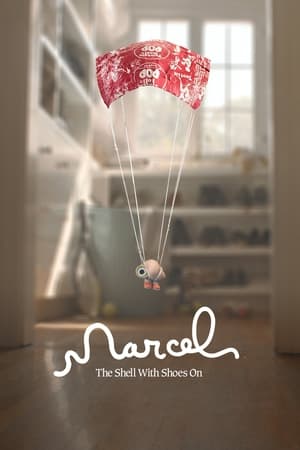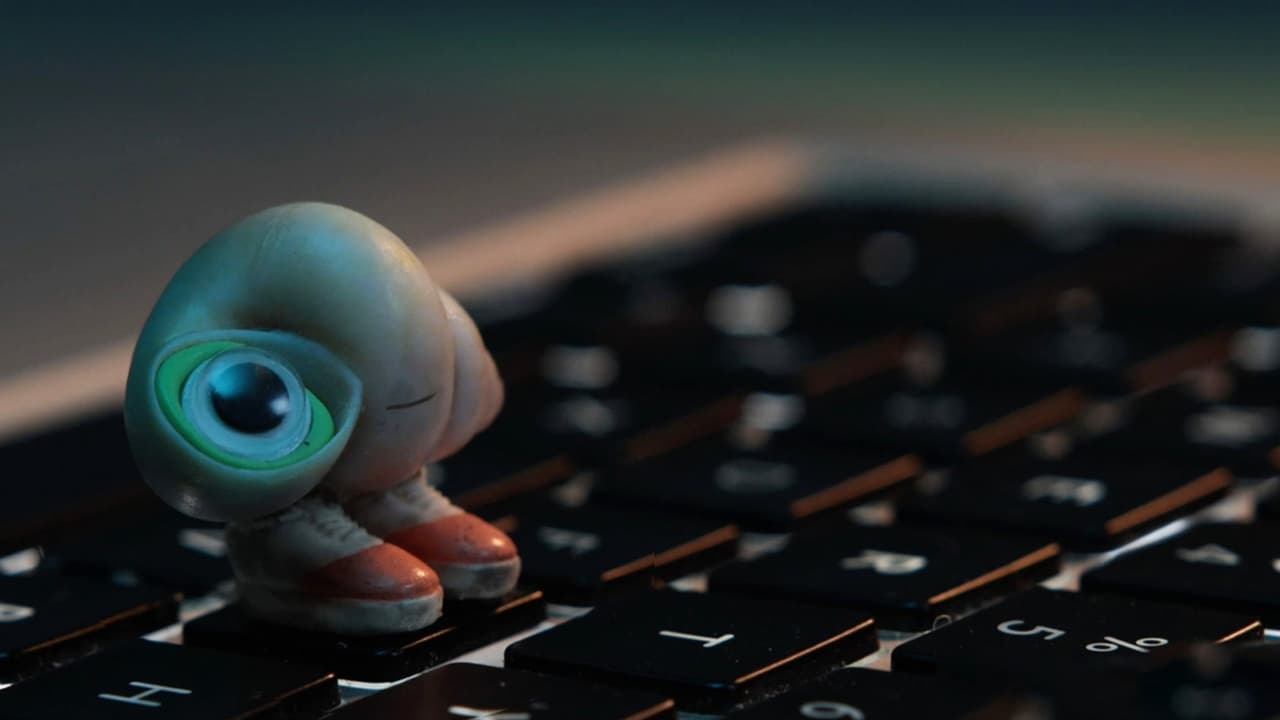
It's so big-feeling and it's so nice
Marcel the Shell with Shoes On could be described as a “reprieve.” This is a kind, gentle, barely-feature-length fable that asks exactly two things of the viewer: find the one-inch-tall talking shell cute, and hope that the one-inch-tall talking shell is ultimately reunited with his lost shell family. I did what I was asked, feeling the whole time like a six-year-old tucked in at night.
When you live in a world that’s fifty times too big for you, normal things become overwhelming. To Marcel (Jenny Slate), the stretch of wall from floor to mantel is a sheer cliff face that must be climbed using drops of honey on the soles of his shoes. A simple hallway represents a long journey, a problem to be solved by blindly rolling around inside a tennis ball. When Dean (Dean Fleischer-Camp), the cameraman filming this mockumentary, aims his camera up at the world from low angles, childhood seems to rush through the perspective. It feels like an innately vulnerable way to look at things, as though you’re lying flat on your back. In contrast, shots from above, gazing out over everyday kitchen and bedroom scenes in Marcel’s home—an Airbnb where Dean is currently living, post-breakup—give a sense of playful aerial spectacle.
In one of the most appealing of the movie’s Honey, I Shrunk the Kids-style inventions, a flick of the switch on a KitchenAid stand mixer, whose whisk attachment is tied to a tree bough outside, results in a glorious shaking of leaves and small, orange fruits plunging out of the heavens.
“We’re all looking at the same thing,” Marcel says at one point, wonderingly. He’s talking about the internet, but it’s easy to take the line and spread it over the whole exercise. Of course, we as an audience are united by looking at the same images on the same screen—and in being asked to view them from Marcel’s perspective, we’re also finally looking at them in the same way. Washed in bright light and ambient music and voiceovers which evoke, of all things, Terrence Malick’s A Hidden Life, the apartment and its little garden grow large, infused with wonder and wistfulness.

The movie isn’t as twee as all this threatens. Marcel himself, though very cute, is just as much snide commentator as wide-eyed innocent. The movie’s improvised script provides enough distance to allow self-aware jokes about the documentary format, which Marcel describes as “like a movie, but nobody has any lines, and nobody even knows what it is while they're making it.” The scenes are playfully shaggy—Dean enjoys a continuous, often funny, only occasionally saccharine back-and-forth with Marcel. I particularly liked a running gag about carsickness, a biting joke about Dean’s avoidant tendencies culminating in a lit candle, and Jenny Slate’s bizarre, tiny, matter-of-fact warble.
Still, I’ll confess confusion about the full theater that laughed uproariously around me. Maybe I’d have reacted the same way had I pre-watched the Marcel short films. These were uploaded to YouTube between 2010 and 2014, and while they also fall under the “cute and wholesome” umbrella, the short format does seem to carry more comedic bite than the movie.
If you have seen more than five movies, you already know the plot of Marcel the Shell. I only need to give you the setup: that Marcel and his grandmother-shell, Nana Connie (a charming Isabella Rossellini), were left behind in the AirBnB when the rest of their shell family were accidentally whisked away by the previous occupant. Marcel and Nana Connie, all alone with their “dog” (a piece of lint), have since devised a subsistence life for themselves, but will Marcel dare to reach out into the wider world to find his family, risking the small beauties of what they’ve created?
I’m sure you’re not screaming Well, will he?! in suspense. The story doesn’t aim to surprise, which isn’t a sin. More of a genuine misstep is the way that Marcel’s journey, including a rapturous online reception, occasionally dips into self-satisfaction or schmaltz. There’s also an undernourished throughline about the difference between community and audience that seems to mischaracterize the internet (which is always both community and audience, and never, as the movie explicitly suggests at one point, only one of the two).

The movie is at its best when it stays tiny and intimate, which is most of the time. Then the familiar sequence of events can recede into the background, offering a skeleton upon which Slate and Fleischer-Camp delicately hang feelings of connection, innocence, awe, and rediscovery. It’s gratifying to see a small creature struggle to accomplish small things, and to see that accomplishment portrayed as meaningful. It’s reassuring to see normal things portrayed as overwhelming when everyday life and its activities so often feel overwhelming to us.
There’s some appeal in a kind of God’s-eye view here. We know the long journey is just a hallway and the cliff face just a wall. We know there’s nothing to worry about. Even a rote story fits into the appeal of that feeling: like paging through a book when we’ve already turned to the end and seen the ways in which it will all be okay.
Rioghnach Robinson lives in Chicago, where she spends 70% of her waking hours dissecting the mindsets of fictional characters; the remaining 30% go toward rubbing her palms together in doomed attempts to generate heat. She writes books under the pen name Riley Redgate, most recently Alone Out Here (Disney Hyperion/2022), and she has also written for The Onion, America's finest news source. You can find her on Instagram, Tumblr, Letterboxd, or her website.
When you live in a world that’s fifty times too big for you, normal things become overwhelming. To Marcel (Jenny Slate), the stretch of wall from floor to mantel is a sheer cliff face that must be climbed using drops of honey on the soles of his shoes. A simple hallway represents a long journey, a problem to be solved by blindly rolling around inside a tennis ball. When Dean (Dean Fleischer-Camp), the cameraman filming this mockumentary, aims his camera up at the world from low angles, childhood seems to rush through the perspective. It feels like an innately vulnerable way to look at things, as though you’re lying flat on your back. In contrast, shots from above, gazing out over everyday kitchen and bedroom scenes in Marcel’s home—an Airbnb where Dean is currently living, post-breakup—give a sense of playful aerial spectacle.
In one of the most appealing of the movie’s Honey, I Shrunk the Kids-style inventions, a flick of the switch on a KitchenAid stand mixer, whose whisk attachment is tied to a tree bough outside, results in a glorious shaking of leaves and small, orange fruits plunging out of the heavens.
“We’re all looking at the same thing,” Marcel says at one point, wonderingly. He’s talking about the internet, but it’s easy to take the line and spread it over the whole exercise. Of course, we as an audience are united by looking at the same images on the same screen—and in being asked to view them from Marcel’s perspective, we’re also finally looking at them in the same way. Washed in bright light and ambient music and voiceovers which evoke, of all things, Terrence Malick’s A Hidden Life, the apartment and its little garden grow large, infused with wonder and wistfulness.

The movie isn’t as twee as all this threatens. Marcel himself, though very cute, is just as much snide commentator as wide-eyed innocent. The movie’s improvised script provides enough distance to allow self-aware jokes about the documentary format, which Marcel describes as “like a movie, but nobody has any lines, and nobody even knows what it is while they're making it.” The scenes are playfully shaggy—Dean enjoys a continuous, often funny, only occasionally saccharine back-and-forth with Marcel. I particularly liked a running gag about carsickness, a biting joke about Dean’s avoidant tendencies culminating in a lit candle, and Jenny Slate’s bizarre, tiny, matter-of-fact warble.
Still, I’ll confess confusion about the full theater that laughed uproariously around me. Maybe I’d have reacted the same way had I pre-watched the Marcel short films. These were uploaded to YouTube between 2010 and 2014, and while they also fall under the “cute and wholesome” umbrella, the short format does seem to carry more comedic bite than the movie.
If you have seen more than five movies, you already know the plot of Marcel the Shell. I only need to give you the setup: that Marcel and his grandmother-shell, Nana Connie (a charming Isabella Rossellini), were left behind in the AirBnB when the rest of their shell family were accidentally whisked away by the previous occupant. Marcel and Nana Connie, all alone with their “dog” (a piece of lint), have since devised a subsistence life for themselves, but will Marcel dare to reach out into the wider world to find his family, risking the small beauties of what they’ve created?
I’m sure you’re not screaming Well, will he?! in suspense. The story doesn’t aim to surprise, which isn’t a sin. More of a genuine misstep is the way that Marcel’s journey, including a rapturous online reception, occasionally dips into self-satisfaction or schmaltz. There’s also an undernourished throughline about the difference between community and audience that seems to mischaracterize the internet (which is always both community and audience, and never, as the movie explicitly suggests at one point, only one of the two).

The movie is at its best when it stays tiny and intimate, which is most of the time. Then the familiar sequence of events can recede into the background, offering a skeleton upon which Slate and Fleischer-Camp delicately hang feelings of connection, innocence, awe, and rediscovery. It’s gratifying to see a small creature struggle to accomplish small things, and to see that accomplishment portrayed as meaningful. It’s reassuring to see normal things portrayed as overwhelming when everyday life and its activities so often feel overwhelming to us.
There’s some appeal in a kind of God’s-eye view here. We know the long journey is just a hallway and the cliff face just a wall. We know there’s nothing to worry about. Even a rote story fits into the appeal of that feeling: like paging through a book when we’ve already turned to the end and seen the ways in which it will all be okay.
Rioghnach Robinson lives in Chicago, where she spends 70% of her waking hours dissecting the mindsets of fictional characters; the remaining 30% go toward rubbing her palms together in doomed attempts to generate heat. She writes books under the pen name Riley Redgate, most recently Alone Out Here (Disney Hyperion/2022), and she has also written for The Onion, America's finest news source. You can find her on Instagram, Tumblr, Letterboxd, or her website.
Categories: animation, coming-of-age






